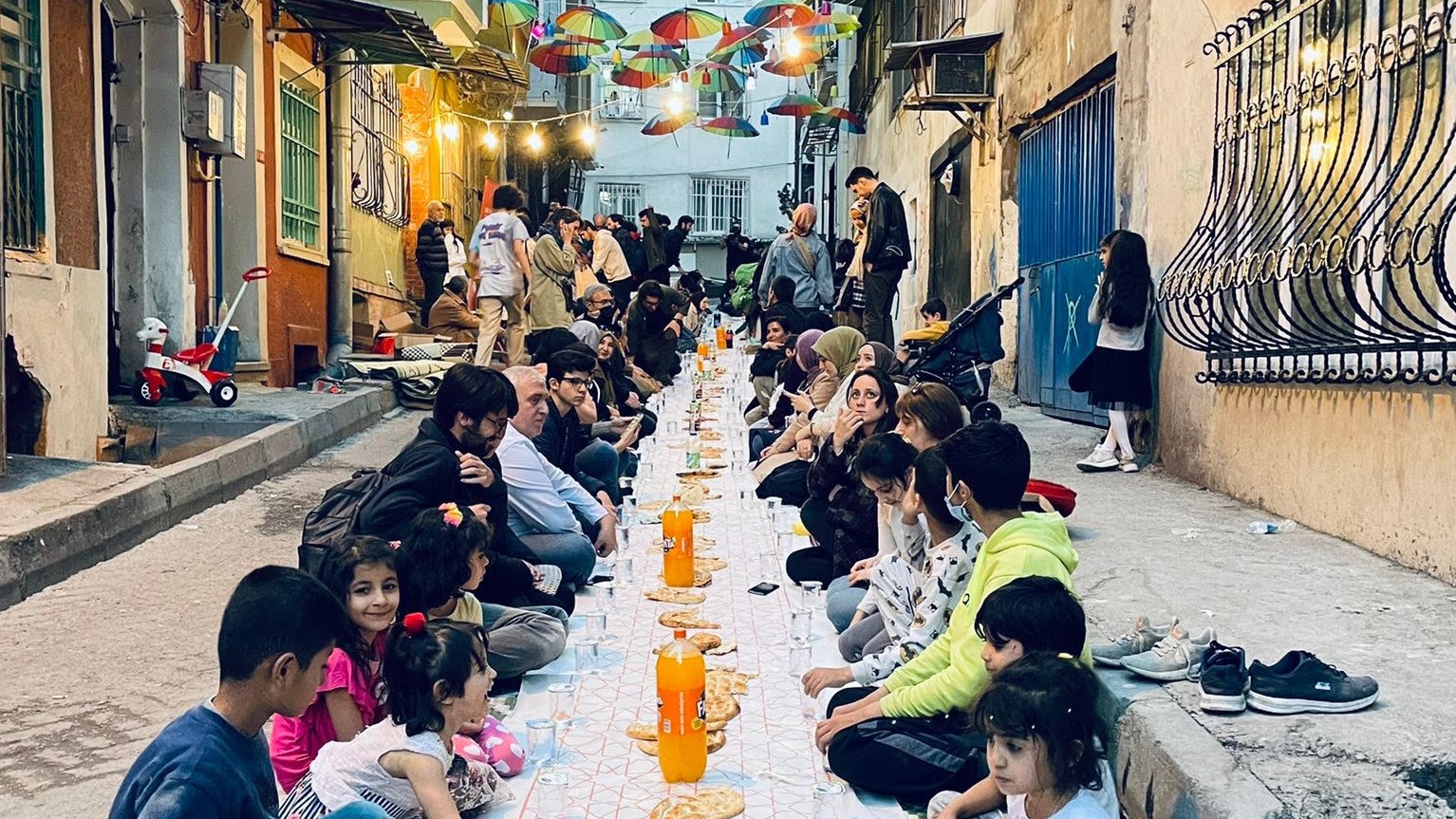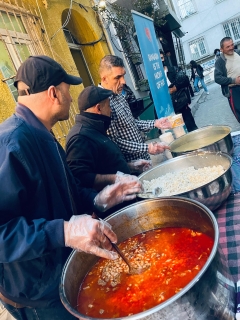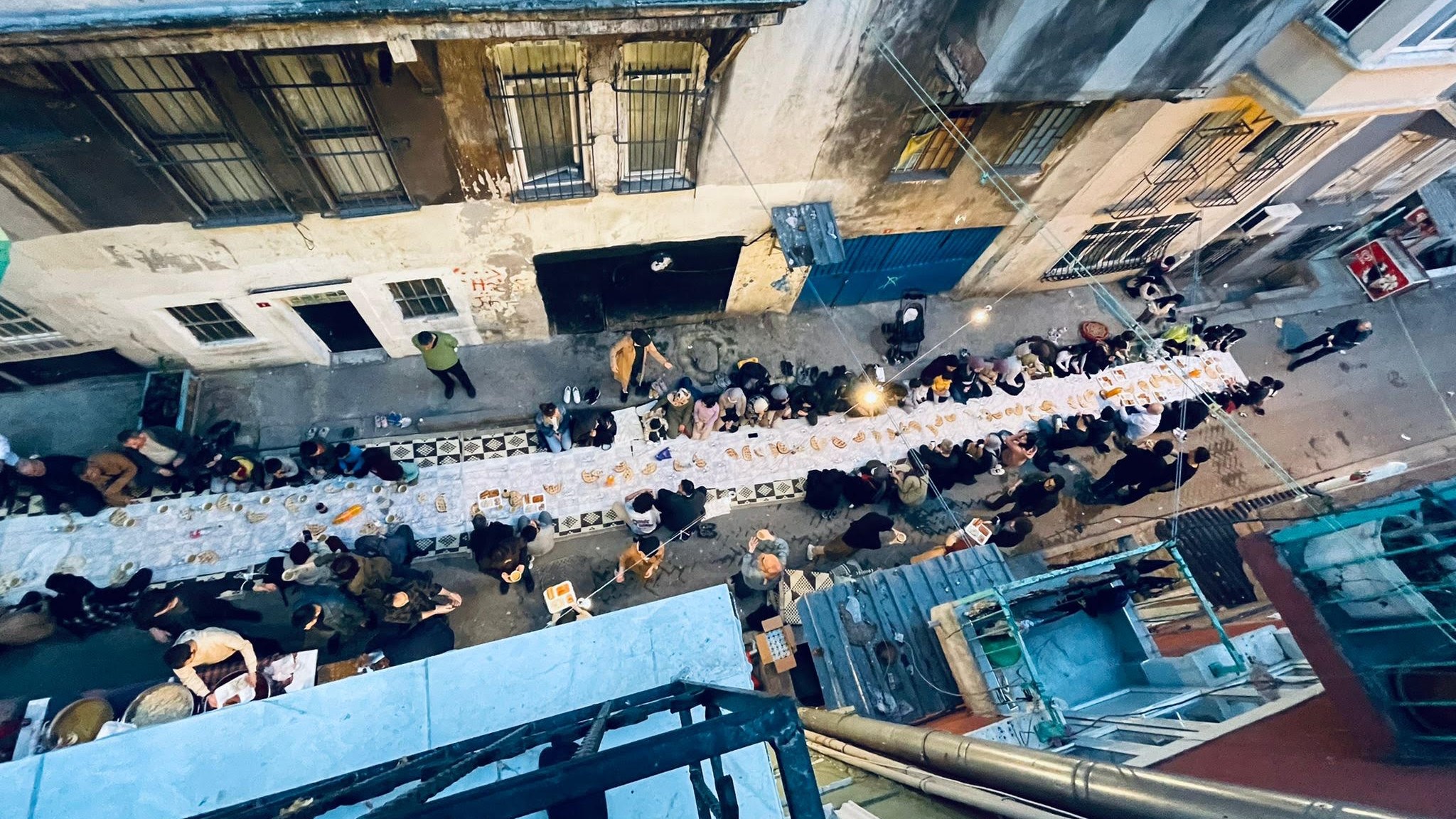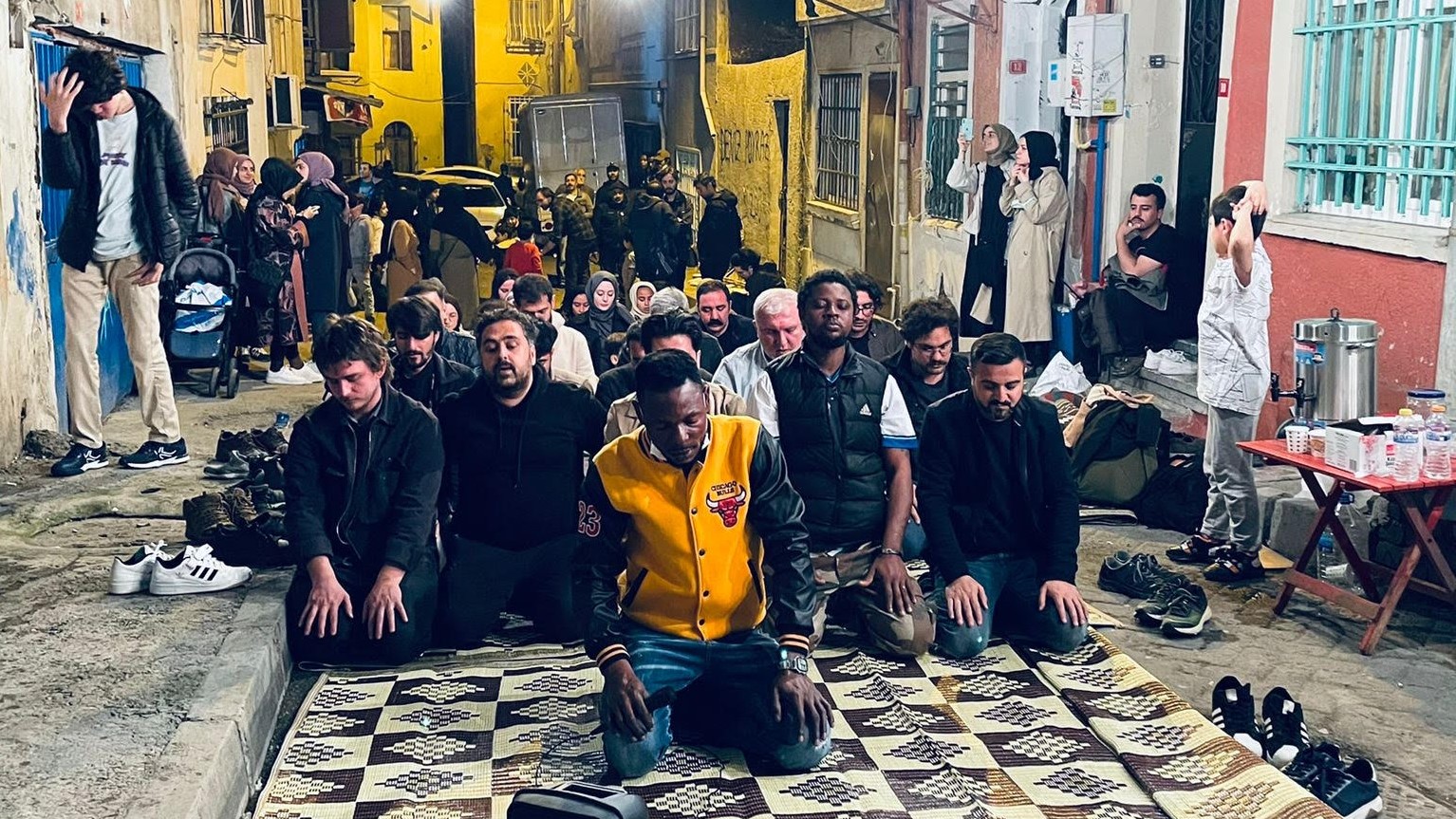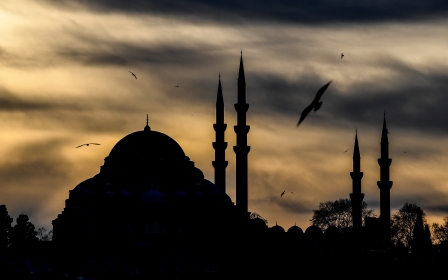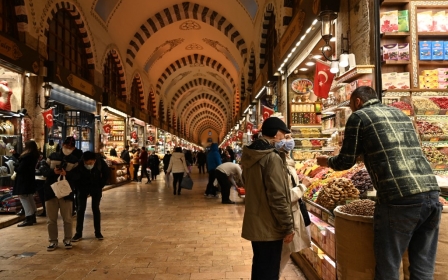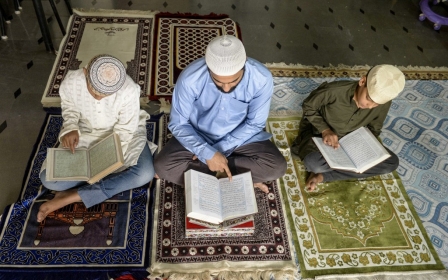Ramadan: An annual iftar in Istanbul brings migrants and locals together
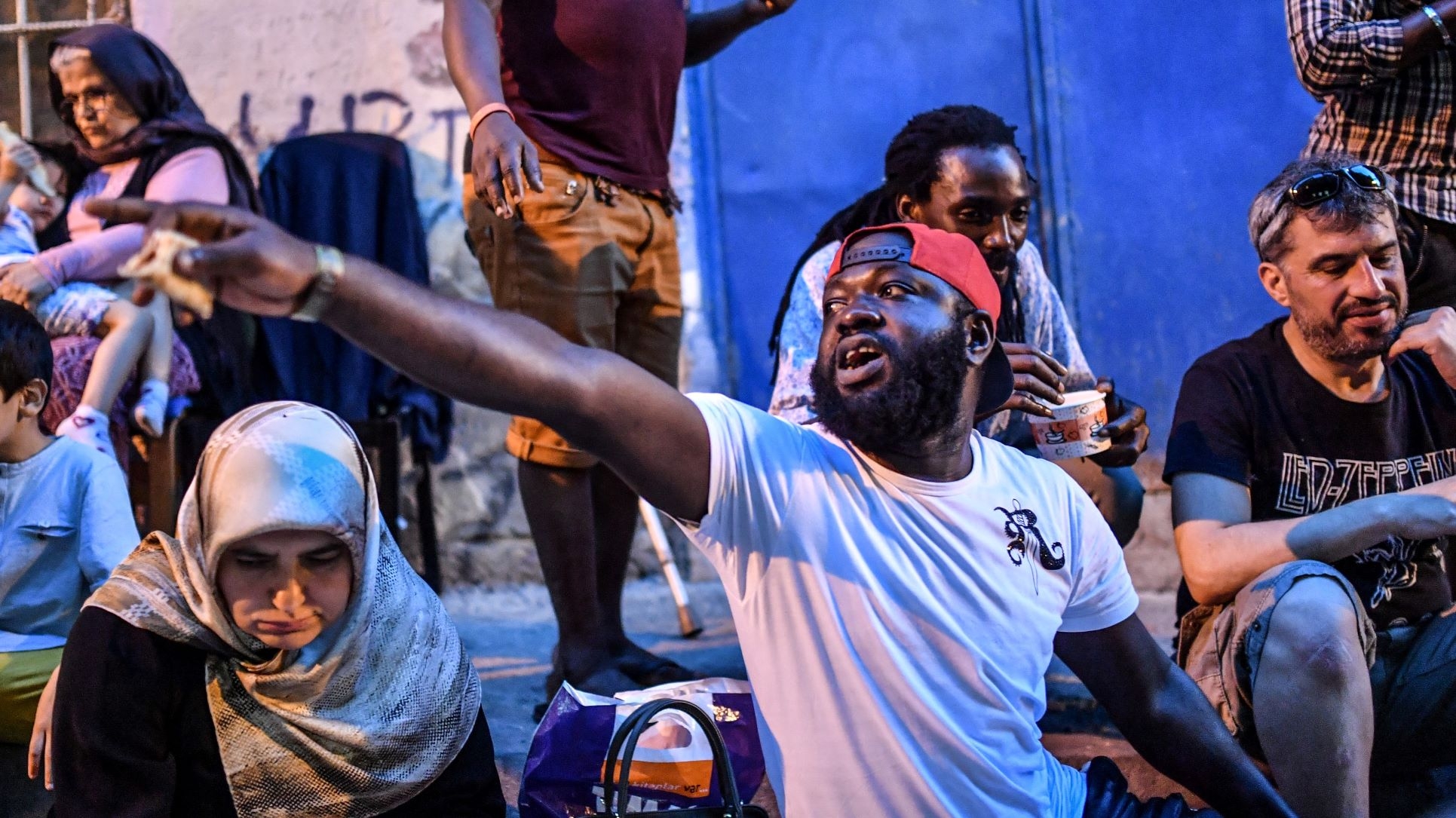
One of Istanbul’s most visible Ramadan traditions are public iftar meals, with streets turning into long table spreads in the evening as neighbours come together to break the day’s fast.
The tradition taps into some of the holy month’s most important values: feelings of solidarity, generosity and a centuries-old tradition of feeding neighbours and the poor.
These days, official institutions such as local municipalities take the lead in organising the mass iftars, but civil society groups arrange them too, offering food to members of the community irrespective of their religion.
One of the most significant is the Tarlabasi Dayanisma (Tarlabasi Solidarity) iftar, named after the central Istanbul district of Tarlabasi, which is close to Taksim Square.
The neighbourhood is one of Istanbul’s most diverse; home to African and other immigrants, as well as some of the city’s most vulnerable locals, such as those dealing with drug addiction and members of the transgender community.
With the forces of gentrification pressing against its borders, public displays of Tarlabasi’s diversity, such as the street iftar, take on a renewed significance every Ramadan.
According to Tarlabasi Solidarity organiser Yasir Bodur, civil society groups like his have had to step in where official help has been lacking.
"This is a district of neglected peoples,” he says. “Even municipal works are not properly carried out here.”
Sense of neighbourliness
Until late in the last decade, Tarlabasi had a reputation among Istanbulites as a place largely lacking a police presence; where drug dealing, street prostitution and petty crime were rampant. Unsurprisingly, that reputation helped depress rents to a level that drew migrants both from within Turkey and outside.
“This is a district where crime, poverty and immigration… intersect,” says Mehmet Yeralan, who with his wife, Fatma, migrated to Istanbul from the heavily Kurdish city of Sanliurfa near the Syrian border 23 years ago. The couple, like many internal migrants, were drawn to Tarlabasi by its cheap accommodation and location close to most of Istanbul’s important landmarks.
“We used to live in the backstreets of the city, and when we first arrived it was impossible to enter some streets because the rate of crime was so high,” Mehmet told Middle East Eye, as he filled plates with rice and beans prepared by Fatma and other residents of the area.
The interests of construction companies, enticed by the prospect of redeveloping this centrally located area, have brought a greater sense of security to the area, but at a price - rising rents and greater economic pressure for those already living here.
They are also affected by problems impacting the rest of Turkey, including inflation, which has shot up to a level far in excess of salary increases. One measure put the 2022 rate of inflation up until March at more than 60 percent, one of the highest rates in the world.
Despite the prospect of worsening economic conditions, Mehmet believes Ramadan offers an opportunity for Tarlabasi’s residents to break from immediate concerns and focus on fostering a sense of neighbourliness and community.
“We simply try to survive, and Ramadan reminds us that being a human is above anything.”
'Religion and colour don't matter here'
A testament to that attitude is that the iftar in Tarlabasi welcomes those of all religions and none.
“I’m here not because I believe in God, but because I believe that neither gender nor religion nor colour make a difference [here],” says one woman who did not give her name.
As sunset and the break of the fast approach, participants rush to lay out dishes, which are served on mats placed on the floor. Fatma is on the lookout for anyone left without food.
“Our goal is to gather everybody around one table. Religion, ethnicity, colour and language don’t matter here,” she tells MEE. “There are 300 people here right now, made up of, perhaps, 10 different nations.”
'We can barely afford an iftar meal in a restaurant. Here we are together with people, both richer and poorer than us'
– Construction worker
The adhan, or call to prayer, signals an end to the 13-hour-long fast and is greeted with a moment of calm, as participants take sips of water and bites of dates. Within moments, the sounds of Turkish, Kurdish, Arabic, Persian, Punjabi, English and French, as well as African languages, mix with the cackle of cutlery and dishes being moved around.
“When we arrived, we used to hear Greek as well,” says Mehmet, recalling a time when the district was home to a now all-but-vanished Greek community. The memory is a reminder of Tarlabasi’s cosmopolitan history, one that is reflected to this day, albeit with a different mixture of communities.
Practical help
Besides solidarity, there are very practical benefits to street iftars in a country where the prices of everyday essentials are moving out of reach for ordinary people, both Turks and immigrants.
“People don’t understand, but we even need one cup of soup, especially at this time,” Mehmet says.
A group of workers employed at a nearby construction site said the communal meals offered them a more dignified alternative to iftars hosted by charitable organisations, which are specifically made for those suffering financially.
“We can barely afford an iftar meal in a restaurant,” said one of the workers. “Here, we are together with people, both richer and poorer than us.”
The iftar also offers access to professionals and civil society groups dedicated to improving the lives of immigrant communities, in particular. Ibrahim Kibar, a lawyer and one of the organisers, believes it is his religious duty to help those in need.
“It is a duty ordered by the Quran to help people who are stranded, to help the poor and to find a solution for their problems, if you are able to do so,” he says.
As a lawyer, he helps immigrants navigate the bureaucracies involved in everyday needs, such as visiting the hospital, arranging residence permits, or resolving disputes with employers.
“For instance, last week an African immigrant failed to collect his salary from his boss and was beaten after a quarrel,” Kibar says. “So we got organised and took him to the hospital to file a complaint to the police.”
That kind of support network is itself a comfort to migrants, amid rising xenophobia in the country.
Ghanaian immigrant Zoubair has been living in Tarlabasi since he arrived in Turkey five years ago. He complains of encountering stereotypes of black people while living in Turkey, but feels at home among the residents of Tarlabasi.
“In these iftar meals, I see many people from different backgrounds, countries, and so forth. What makes me feel very comfortable is that there is no racism,” Zoubair says, cutting short the conversation to get ready for the maghrib (sunset) prayer.
“Last week I led the prayer, but right now I’ll leave it to my Senegalese friend,” he adds, smiling.
Middle East Eye propose une couverture et une analyse indépendantes et incomparables du Moyen-Orient, de l’Afrique du Nord et d’autres régions du monde. Pour en savoir plus sur la reprise de ce contenu et les frais qui s’appliquent, veuillez remplir ce formulaire [en anglais]. Pour en savoir plus sur MEE, cliquez ici [en anglais].


